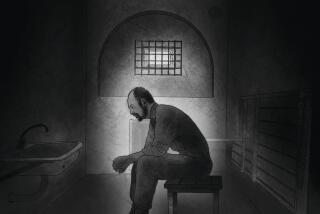Special Report on Soviet Health Care : The Soviet Psychiatric System: ‘Behind the Fence There Is Lawlessness’
- Share via
MOSCOW — The Kashnekov City-State Hospital, with its 2,700 beds, is a sprawling complex of gray buildings that resembles many another aging mental institutions. It stands amid a small birch forest in what was once a countryside, far enough from the city to provide a barrier of distance between society and the patients.
But at a time when the commitment of political dissidents to Soviet psychiatric institutions is coming under new international scrutiny, hospitals such as Kashnekov are also coming under fire domestically, albeit for reasons that have less to do with international politics than with age-old criticism of psychiatry the world over.
Such unprecedented internal criticism has been all but overlooked as Soviet and American psychiatrists prepare to inspect one another’s mental hospitals later this year. The bilateral visits were announced earlier this year.
Kashnekov Hospital is one of several Soviet mental institutions that were heavily criticized by the Soviet press last November.
In a stunning expose, Komsomolskaya Pravda, the Communist youth newspaper, told of psychiatrists who accepted bribes to help accused criminals escape punishment by certifying them as being mentally ill.
The newspaper also poked fun at the different schools of thought among Soviet psychiatrists that would allow a person to be labeled a schizophrenic in Moscow, a psychopath in Leningrad and a healthy individual in Kharkov.
Finally, the paper scoffed at Soviet laws that allow workers who criticize management to be committed simply because they “search for the truth and don’t fear conflicts with the authorities.”
“Psychiatric science and practice have long ago been shut off from openness by a high and solid fence,” the newspaper said. “Behind the fence there is lawlessness.”
The Komsomolskaya Pravda article and the reaction it apparently provoked have shed unprecedented light on the shadowy nature of Soviet psychiatric practices.
Shortly after the story appeared, Dr. Marat Vartanyan, deputy director of the All-Union Research Center of Mental Health, admitted in an interview at the hospital that the story contained more than a grain of truth.
But he also expressed concern that the article would unwittingly give psychiatric hospital patients, as well as others who could benefit from treatment, a legitimate rationale for avoiding the system.
Also, Vartanyan said the article’s harsh criticisms had created “panic” among certain government bureaucrats and some of the country’s 28,000 psychiatrists who say that such criticism has unleashed a simmering public hostility toward psychiatry in general.
Indeed, that very day he was to attend the funeral of a fellow psychiatrist who had been killed by a patient as a direct result, Vartanyan said, of the “anti-psychiatry attitude that the article has provoked.”
Still later, two other psychiatrists were knifed to death in Moscow and a third was badly injured--all deeds committed by disturbed patients who, it was believed by psychiatrists, were reacting to the news story.
Perhaps the greatest domestic criticism of Soviet psychiatry is that it lacks proper guidelines for committing someone to a mental institution.
All it takes now is for three physicians to certify within 24 hours that a person is “socially dangerous.”
Vartanyan said improper hospitalizations and other abuses are the doings of “doctors of low qualifications” rather than the consequence of state policy.
A number of psychiatrists interviewed at Leningrad’s Bekhlerev Psychoneurological Research Institute agreed.
“I think (abuses) actually happened,” said Dr. Modest Kabanov, the institute director. “But they happened because of a lack of openness in psychiatry, not because it was state policy.”
A second, more recent article in the government newspaper Izvestia has further revealed the extent to which Soviet psychiatrists can disagree over the question of when a patient should be considered dangerous and therefore institutionalized.
One psychiatrist was quoted as saying that individuals who are aggressive and who “disturb society” fit the bill. Another said acts that disrupt an institution’s work schedule should be included. A third said involuntary commitment should be prescribed only for those guilty of “criminally punishable” acts.
The Izvestia article said such examples of “straitjacket thinking” deter prospective patients from seeking treatment. “It’s not for nothing that people avoid psychiatry,” the article said.
Kabanov said a committee of doctors and lawyers is now drawing up a law to better safeguard the rights of mental patients.
“I don’t know what it will lead to, but I am sure it will lead to something,” he said.
More to Read
Sign up for Essential California
The most important California stories and recommendations in your inbox every morning.
You may occasionally receive promotional content from the Los Angeles Times.












